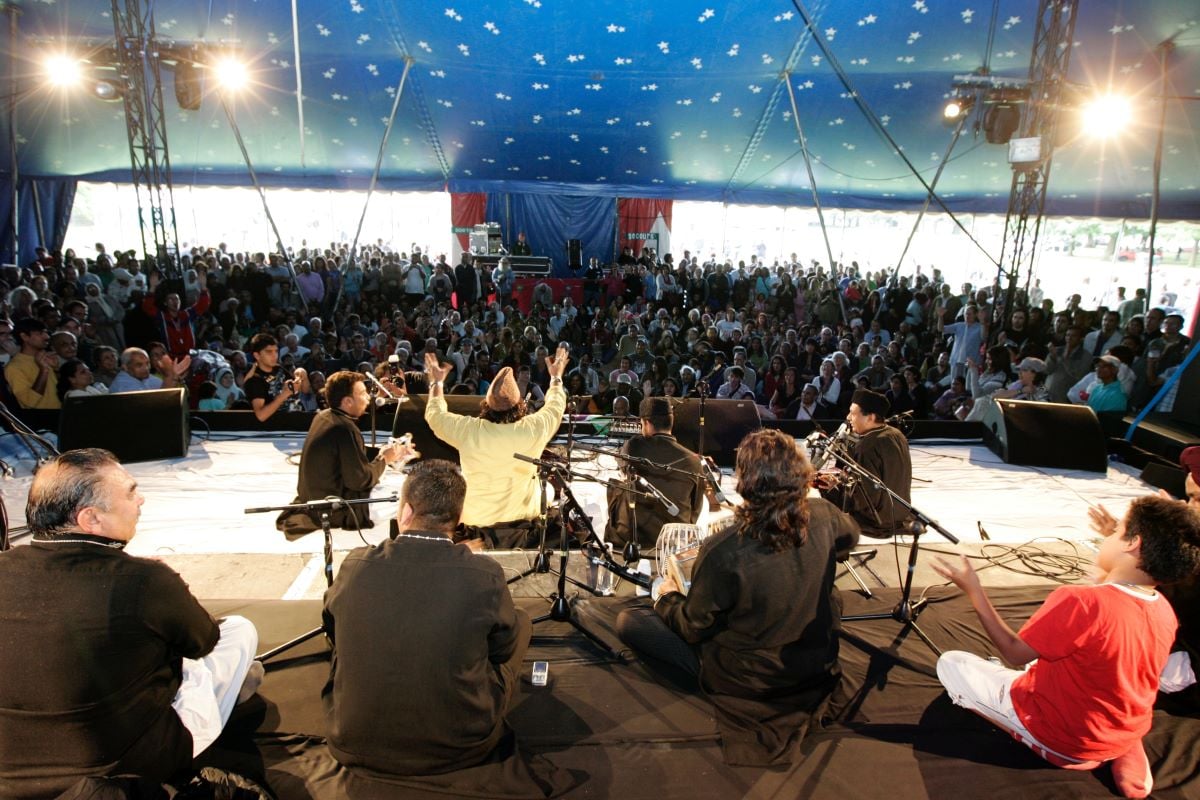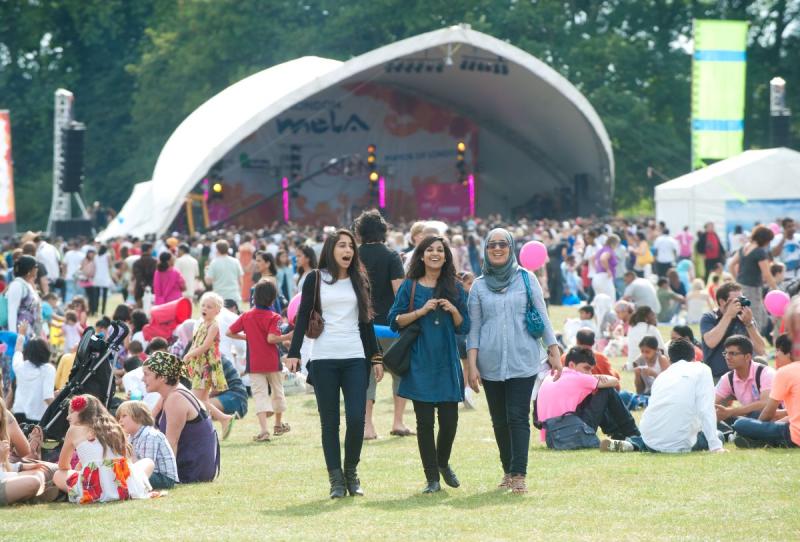
Sufi Qawwali at London Mela
Photo: Tim Smith
Mela matters
A new report on a little understood artform – Mela – has been launched this week. Ajay Chhabra shares why this is such a milestone.
From Easter celebrations to Passover and Eid, spring offers a range of moments for renewal and connection, a time for people to come together. And this spring marks the launch of The Mela Report* – the first of its kind to be published – detailing the importance of this diasporic artform in the UK.
The report reflects on the practice of Mela artists and the communities they serve in the UK and offers four key recommendations to policymakers and sector stakeholders in the areas of Stakeholder engagement, Resource and research, Collaboration and co-design, and Volunteer engagement. It is a clear reminder that Mela matters.
The meaning of Mela
Mela is the meeting, the coming together, the mix, the blend of unique aspects of our society – creative, resilient, spiritual. It comes from the Sanskrit ‘to meet’, related to ‘milana’ the verb to mix, to tune, to come together and is used to describe a large gathering of people, a fair or a festival.
At a time when understanding of each other, of difference matters so much – particularly with face-to-face opportunities, Mela plays an important role.
The Mela Partnership, led by Nutkhut, is a diverse, national membership network of festivals, volunteers and producers. It develops high quality creative programming, shares learning and builds capacity.
The Partnership supports the commissioning and touring of new and innovative outdoor arts productions, facilitates networking events and seminars and supports the professional development of the next generation of Mela makers. Our strength, impact and growth are the result of our diversity of faith, class and gender.
Mela is often the only publicly funded arts activity which families attend outside their own family or community events.
Independent perspectives
In the commissioning of this report, Nutkhut and the Mela Partnership wanted to bring together a range of perspectives – independent, collective, historical and future-facing – to the wonderful world of Mela and to steer clear of the echo chamber of the same voices, the same networks who, in many cases, come from narrowly defined backgrounds.
So we have brought together new voices, unique voices, that not only allow for a fresh perspective, but align our place in the wider arts ecology. The independent thinktank British Future has helped shape and inform the process through research and interviews resulting in recommendations for future policy.
Our strength is in our diversity, from consultant surgeons to serving officers in the British Army, from taxi drivers to teachers, from arts entrepreneurs to retired health workers. Our partners come from all walks of life, many started and have continued as volunteers, who have a web of connections with local neighbourhoods and communities through the lens of faith, family, schools and community groups.
An entrepreneurial spirit
Renewal runs through Mela: the ability to adapt with very few resources, an entrepreneurial spirit and an acceptance that change is inevitable.
“The Peepul Centre has always been an arts centre that works across sectors, from health to education to wellbeing. During Covid, while other theatres and arts centres went dark, our doors remained open, and we became an essential vaccination clinic and food bank. We exist because of our community.” Anil Bhanot OBE, Peepul Centre, Leicester
The pandemic told a perfect Mela story as colleagues across the nation came together. While theatres and venues closed and staff were laid off, the Mela community's response was simple, from artists and audiences, delivery drivers, shopkeepers and healthcare workers asking the question: “How best can we support and engage and help our communities?”
The pandemic proved to be a pivotal moment for Mela. From running Covid test centres to vaccination clinics, from advice centres to food banks, during that period our partners played a vital role nationally. But it also saw the demise of pockets of Mela across the country.
The influence and impact Mela has had across the UK and the global diaspora is clear. Across art forms, from fashion through to design, Mela has had a profound impact on the areas and communities in which it exists, yet it fails to be recognised, often due to the way some stakeholders continue to perceive it as low status.
As with many artforms that have emerged in the UK as a result of its diaspora, Mela has had a broad and lasting impact; its global impact is yet to be understood. From international collaborations with technology entrepreneurs, to truck art with local faith craft groups, the dimensions and layers of Mela are many.
 London Mela. Photo: Hayley Madden
London Mela. Photo: Hayley Madden
Recognising value
Mela not only faces external challenges but also internal challenges. Its founders are fiercely independent, which has resulted in an insular approach and a reluctance to share. The Mela Partnership emerged as a result of wanting to bring people together to share good practices.
While Mela remains a traditional social and cultural bond that unites and celebrates identity, it also has a remarkable renewable energy which has created a number of firsts including the world's first VR Digital Mela (Melatopia) and ‘Elephant in the Room’ seminars which tackle the issues of our time.
But what is it that makes Mela so compelling? In financial terms, Mela is a poor cousin among outdoor arts festivals and organisations. It's the cousin that intrigues us all, the flamboyant, the charismatic. Language, identity, a willingness to learn and share sets Mela apart from the mainstream outdoor arts sector.
The Mela Report makes no attempt to be a detailed historical account of facts and figures. It's simple in its purpose, to provoke debate and encourage dialogue towards constructive and thoughtful recommendations.
As Lord Dholakia says: “This is a watershed moment in the UK for public celebration and the coming together of diaspora communities. Mela, so intrinsically a part of our arts and cultural life but so easily ignored, The Mela Report attempts to address this.”
Mela matters and will continue to matter. While holding true to its original meaning of ‘meeting’, we use Mela in its purest form, as a metaphor through moments of universal connection and joy in bringing people from all walks of life together.
Ajay Chhabra is founder and co-Artistic Director of Nutkhut.
![]() www.nutkhut.co.uk/
www.nutkhut.co.uk/
![]() @abracachhabra
@abracachhabra
![]() [email protected]
[email protected]
* The report by The Mela Partnership was presented in the House of Commons by Leo Docherty MP, Parliamentary Under-Secretary, Foreign, Commonwealth and Development Office, with Lord Dholakia, Deputy Leader of the Liberal Democrats in the Lords, and Darren Hedley, CEO of Arts Council England, and attended by Mela producers and policymakers.
Join the Discussion
You must be logged in to post a comment.